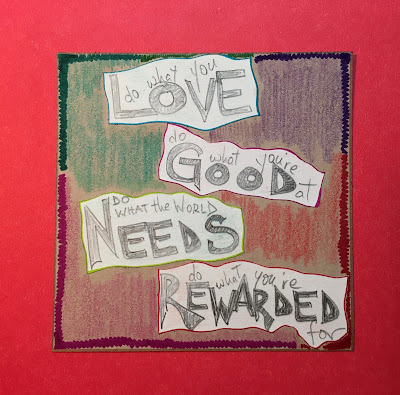What are you doing?
 |
| I heard the interview in Feb. 2019. I made this piece in July 2020, and I am putting it all together in my day-to-day life in 2021. |
I have left full-time work to pursue productive engagement with my interests, at a self-managed more leisurely pace. I have planned for this and I am privileged to be able to fund it. Some might call it following my passion, but that is a phrase — and a construct — I do not like. Passion is for the bedroom; fulfilment is for the everyday. And that is what I am after: Satisfaction, every day, in the doing of things I enjoy and am good at.
No more corner office. No more grand title. Just a solid sense of my evolving self as a writer and community educator — who is also a visual artist, and who has a way of thinking and being in this world that is worth sharing. And — so exciting, I am meeting people who want what my creative collaborator, Deborah Schnitzer, and I are offering through our ‘writing as tool for transformation’ workshops.
It seems, in essence and in practice, that I am living ikigai, the ancient Japanese philosophy of how to build a meaningful life. I first learned about this from an interview with Tim Tamashiro, a former CBC Radio host, who “quit [his] job to focus on [his] work”. He explained that “iki” means ‘life’ and “gai” means ‘worth’ in Japanese. Put them together and you get “life’s worth” or “life’s purpose”. Ikigai is active, it is a verb, so for Tamashiro, his ikigai is “to delight”.
Ikigai is built or discovered by pursuing four paths of intention: Do what you love. Do what you’re good at. Do what the world needs. Do what you’re rewarded for.
Tamashiro warns that exploring these paths takes work and effort, and it’s sensible to begin wandering down the first two to get you going: Figure out what you love to do. Figure out what you’re good at doing. With any luck, there will be an intersection between those paths! Then extend that intersection by doing what the world needs and what you can be rewarded for. You may not end up with a job, but you might just find your life’s work.
I don’t offer this story lightly and I am not advocating a reckless leap off the 9-5 cliff. No. But I do happily offer the nugget that one’s job and one’s work might be two different things. And that the philosophy of ikigai might just be the way to discern the difference.
 |
| From Tamashiro's 2018 TEDx Talk in Calgary. I would say that my ikigai is two-fold: to teach and to connect. |
———
Land acknowledgement: I respectfully recognize that I live on the original lands of Anishinaabe, Cree, Oji-Cree, Dakota and Dene peoples, and on the homeland of the Métis Nation.



Amanda,
ReplyDeleteIn your life's journey after full-time work, I am glad that you following those four paths of intention and learned about the concept of ikigai from Tim.
Indeed, ikigai does mean "life's purpose".
For me, I spent most of my career working at Environment Canada. There were pluses and minuses working for the federal government. Many of us chose this idealistic career path to provide a public service to Canadians. But frankly I often found myself frustrated with the giant bureaucratic inertia that prevented us from using the climate change research and recommendations from our findings (that taxpayers paid for) into developing and implementing policy, products and services that would make a difference to Canadians and the world.
As COP26 ended, I shook my head at how little the world's leaders were willing to commit again to prevent us from reaching that "tipping point" of a global 2C temperature rise. The impacts of a changing climate and extreme weather are affecting us right now. This week's dramatic flooding/landslides in British Columbia, and the heat dome and wildfires that ravaged the BC earlier this summer are some examples.
Sorry for that rant, but I agree with you there is a difference between what I did in my job vs what is now my life's work as a retiree. I'm still trying to figure that out...
I appreciate your rant, Grace. It is justified. And I appreciate your readership!
DeleteI'm so glad, Amanda, that you are well and able to do what you are setting out to do after a lifetime of toiling for someone else. I retired 16 years ago, from a job I despised but from work I loved. So I understand Tamashiro. My biggest joy during these past years is that I've been what I call the "camp nurse", the neighborhood resource for cuts and bumps, sick tummies and sick hearts. Sometimes it has been exhausting, but always it has been rewarding.
ReplyDeleteNow I'm at a time in my life when I don't quite have the energy to get up in the night and go next door, call 911 for my neighbor with signs and symptoms of a heart attack. At present I just listen, mentally triage, and say call your doctor or call 911.
Thank you for your thoughts. I shall reread and ponder.
Oh dear. Finta is Ann Mason
ReplyDeleteCongratulations Amanda, I'm so glad you have found your ikigai, I know that I've found mine and it's the happiest time of my life.
ReplyDelete